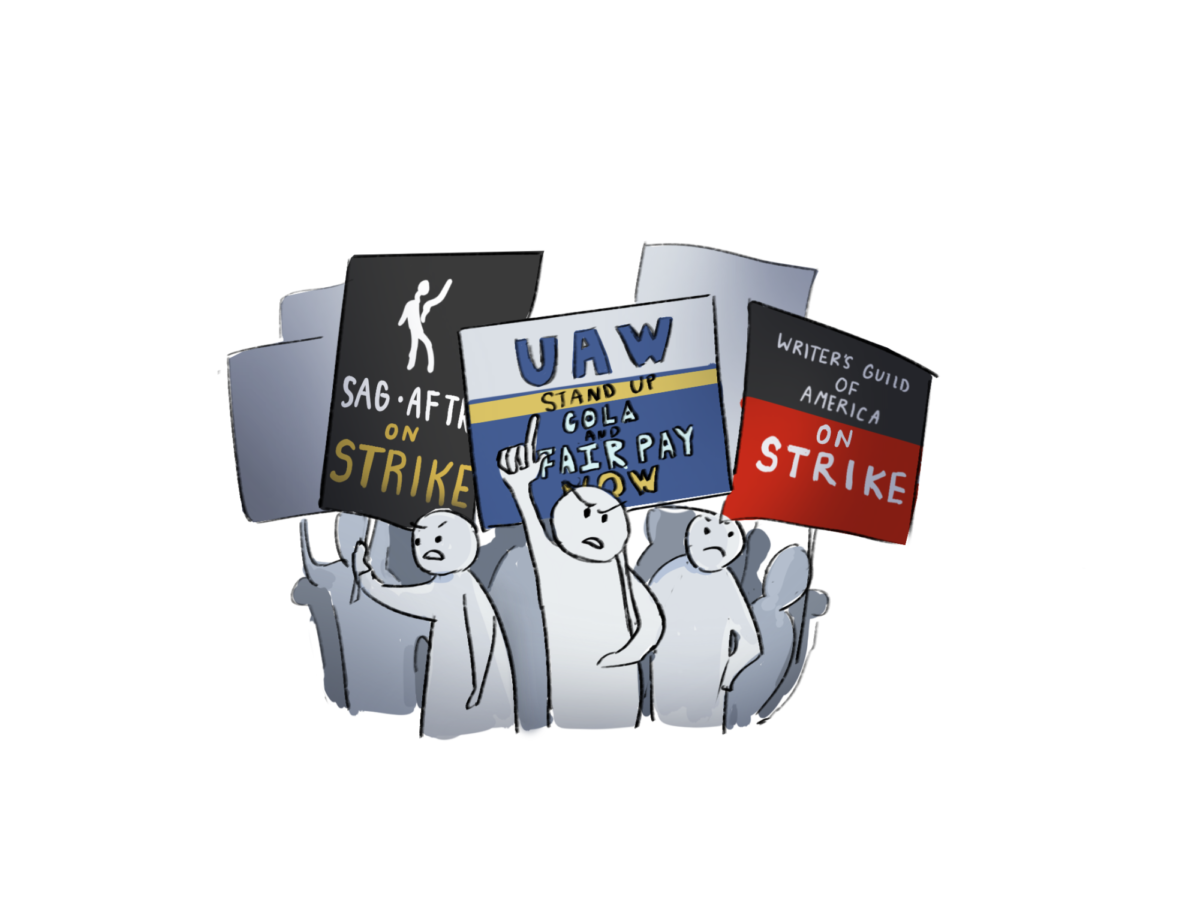Indefinite periods of little-to-no pay, risking permanent job loss, undergoing socio-economic stress, losing profit, disrupting the economy—as President Biden said in a statement on Sept. 16 supporting recent union activity of the United Auto Worker (UAW), “Let’s be clear, no one wants a strike.”
But as corporate billionaires consistently neglect their workplaces, labor forces grow increasingly restless. While profits are skyrocketing, wages remain stagnant, leaving many workers living paycheck to paycheck. This year, we have seen the labor movement as active as ever with the recent summer of strikes. From automaker workers to actors, from writers to nurses, from flight attendants to hospitality workers gathering or planning to gather on the picket line—the question is, who isn’t striking?
Through unions and employee-wide work stoppage, striking has been common practice among workers used to rectify working conditions and pay since 1842, and has been a protected right under the National Labor Relations Act since 1935. In 2023, we’ve seen unions using this right to its fullest purpose: to return autonomy back to workers and provide them with what little power they have under the distribution of wealth and power in the U.S..
While wages have just recently started outpacing inflation, most American working class citizens are still feeling the results of the static wage growth of the last decade and a half. Even with overall increased industry productivity over the last few years, the ones benefiting most have been the top 10 percent of earners. And with the current momentum of outrage among workers across all industries fueling it, radical action has, at last, proven successful on one front: union efforts.
Recorded as one of the biggest walkouts in the entertainment industry, the union representing 11,500 writers of film, television, and online media, the Writers Guild of America (WGA) began a strike action on May 2. After picketing and disrupting the headquarters of major studios including Netflix, Amazon, Universal, and Warner Bros. for five and a half months—146 days to be exact—the WGA finally reached a tentative agreement with the Alliance of Motion Picture and Television Producers (AMPTP) on Sept. 24.
According to CBS News, the deal fell in favor of the writers with terms that would level the playing field for union workers and future writers in the entertainment industry. WGA’s major demands included increased minimum compensation that covers residual bases, minimizing writer staffing, guaranteed period of employment, and regulation of artificial intelligence.
What’s more, just a little after two months of WGA strike action, writers were joined by another union representing roughly 160,000 actors, the Screen Actors Guild-American Federation of Television and Radio Arts (SAG-AFTRA). Now, as the WGA ratifies an agreement with AMPTP, many anticipate SAG-AFTRA reaching a similar deal. WGA’s agreement with AMPTP puts expectant eyes on SAG-AFTRA’s overlapping demands. Because the great thing about union participation is that strike settlements benefit more than just the unionized or even just one union.
According to a report released by the House and Senate committees, unions create, on average, a 10.2% increase in wages while also having a likelihood of increasing wages for other non-unionized parts of the same labor force. Other union shops, which are places of employment where the employer only recruits labor union members, may see the increase in wages and adequate workplace conditions as a result of strike settlements. This leaves corporate heads with no choice but to improve conditions for their employees to stay competitive and prevent the threat of a strike.
Feeling the benefits of the writer’s strike, actors of SAG-AFTRA have their peers at the WGA to thank as a part of the wave to push fair compensation. But, this year’s notable strike activity has not stopped at Hollywood.
On Sept. 15, the picket line expanded to include the UAW strike, according to the New York Times, against the Big Three auto companies—Ford, General Motors, and Stellantis—which currently involve 18,600 workers across 38-parts distribution centers and three assembly plants, and is threatening to expand to the rest of the 150,000 UAW workers at the Big Three. Authorized strikes, which are approved contracts that gives unions the authority to strike but does not mean a strike is planned to happen, also rise in number like the Association of Professional Flight Attendants on Aug. 30, OHSU nurses on Sept. 18, Coalition of Kaiser Permanente Unions on Sept. 22, and Las Vegas hospitality workers on Sept. 27.
Just this summer in early August, the International Brotherhood of Teamsters approved a new contract promising higher minimum pay and improved working conditions after the union representing more than 340,000 United Parcel Service (UPS) members threatened to strike. The strike crisis was averted, but had the UPS workers strike lasted up to even a mere 10 days, the U.S. economy would have lost more than $7 billion, as reported by the consulting firm Anderson Economic Group.
Workers have finally made a mark in clawing back their right to work under fair conditions and compensations, and this is not just a moment that will blow over. Rather, this is the beginning of a long overdue wake-up for corporations, as newer generations of the workforce emerge and realize, enough is enough.







![Alexander McAllister (10) [third from the left] practices with his rowing team at Mission Bay, Feb. 8. McAllister has learned to work in unison with others on the water.](https://wvnexus.org/wp-content/uploads/2024/02/alex-rowing-1-1200x837.jpg)

